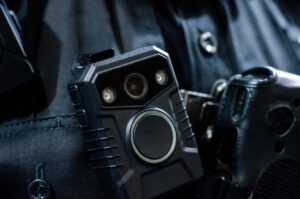
It is often possible to use bodycam footage at trial in a criminal case. Although there are a handful of exceptions that might keep it out, most judges will allow this important evidence to be seen by a jury.
Our Philadelphia criminal defense lawyers can answer questions about how this footage might be used against you at trial or how you might even benefit from it.
When is Body Camera Footage Admissible in a Pennsylvania Court?
Body cam footage can be used against you in many criminal cases. The same rules for this footage apply to any other type of video evidence that might be used in a criminal proceeding. In order for the court to consider body cam footage, they must first rule it to be admissible at trial. To do so, the party offering the evidence needs to authenticate it.
Authenticating video means establishing that what the video depicts is what actually happened at the time and verifying the video’s source. Often, this is done by bringing the officer who recorded the footage in to testify during the trial and asking questions about how and when the footage was shot.
Once authenticated, the judge will only prohibit its use as evidence if something in the footage violates another rule of evidence. This could include a hearsay statement or footage deemed more prejudicial than relevant.
For a free legal consultation, call 215.515.3360
The Prosecutor Can Rely on Body Cam Footage
As long as the footage is deemed admissible by the judge, the prosecutor could use it against you at trial. There are a number of reasons why the prosecution might submit body camera evidence in court:
- The most common reason is that the video allegedly records you in the midst of criminal activity. This may be strong evidence for the prosecution, but body cam footage can be grainy and difficult to comprehend, giving our defense attorneys the chance to dispute it.
- Another situation where the police rely on body camera footage is when they make contact with a suspect in a criminal case. If you made any admissions of guilt, police body cameras can be used in court to show your confession to the jury.
Body camera evidence can have a major impact on a jury. Instead of having to choose between competing stories from witnesses, they are often able to see a crime or an admission with their own eyes and decide what actually occurred. The good news is that our legal counsel could use a video of you being arrested to downplay your involvement in a crime or even potentially prove your innocence.
Police Body Cam Footage Might be Helpful to Your Defense
In an era marked by growing calls for police accountability, body cameras have become far more prevalent among officers on duty. The footage from these cameras can provide a clearer picture of what happened during or after an arrest, especially when the two sides in a criminal case disagree.
Even though police body cam footage is evidence collected by law enforcement, it might have a very positive impact on your defense. Having an incident caught on camera can clear up disputes and discrepancies between the parties and allow a jury to see how things played out for themselves.
Footage Could Contradict an Officer’s Statement
One of the ways our Philadelphia lawyers can use body camera footage is to contradict a statement made by one of the officers at the scene of the arrest. The prosecution frequently relies on the trustworthiness of the police to bolster their case. If we can show that an officer was untruthful in their statement or witness testimony, it can have a dramatic impact on your defense.
Footage Could Corroborate Witness Testimony
It is not uncommon for every person present at an arrest to remember how it happened differently. Even if a neutral witness provides testimony that is favorable to the defense, having it backed up, at least in part, by body cam footage could go a long way in your case.
Footage Could Highlight Constitutional Violations or Bias
The video might record statements made by the officer that reflect negatively on them, even when they are not actively interacting with you. This might include statements to other officers that suggest they are biased against you in some way. They could also record themselves admitting to violating your rights, like with an illegal search.
Lack of Footage Could Sway the Jury
Another way that body cam footage could positively impact your case is when it is inexplicably unavailable for the jury to review. If an officer was wearing a body camera at the time of an incident but failed to turn it on or even turned it off, our legal team can use that fact to persuade the jury that they are trying to hide something.
How to Request Body Cam Footage for Your Case
According to the Pennsylvania Office of Open Records (OOR), you have sixty days from the date the recording was made to file a formal request for body camera footage. Our criminal defense attorneys can file this request, make sure the police respond in a timely manner, and explain the footage’s contents to the jury.
If the police try to use body camera footage against you, we can request a copy of that footage from the prosecution before the trial, review it carefully, and find ways to undermine whatever arguments the prosecution tries to make based on the footage.
Let Our Attorneys Help You Build the Strongest Possible Defense in Your Criminal Case
Body camera footage can be used against you in a criminal case, but it often helps the defense as well. If you have questions about whether body cam footage is admissible in court, now is the time to reach out. Contact the Law Offices of M.J. Snyder, LLC, right away for a free consultation. Our case results show that we know how to advocate for clients.




